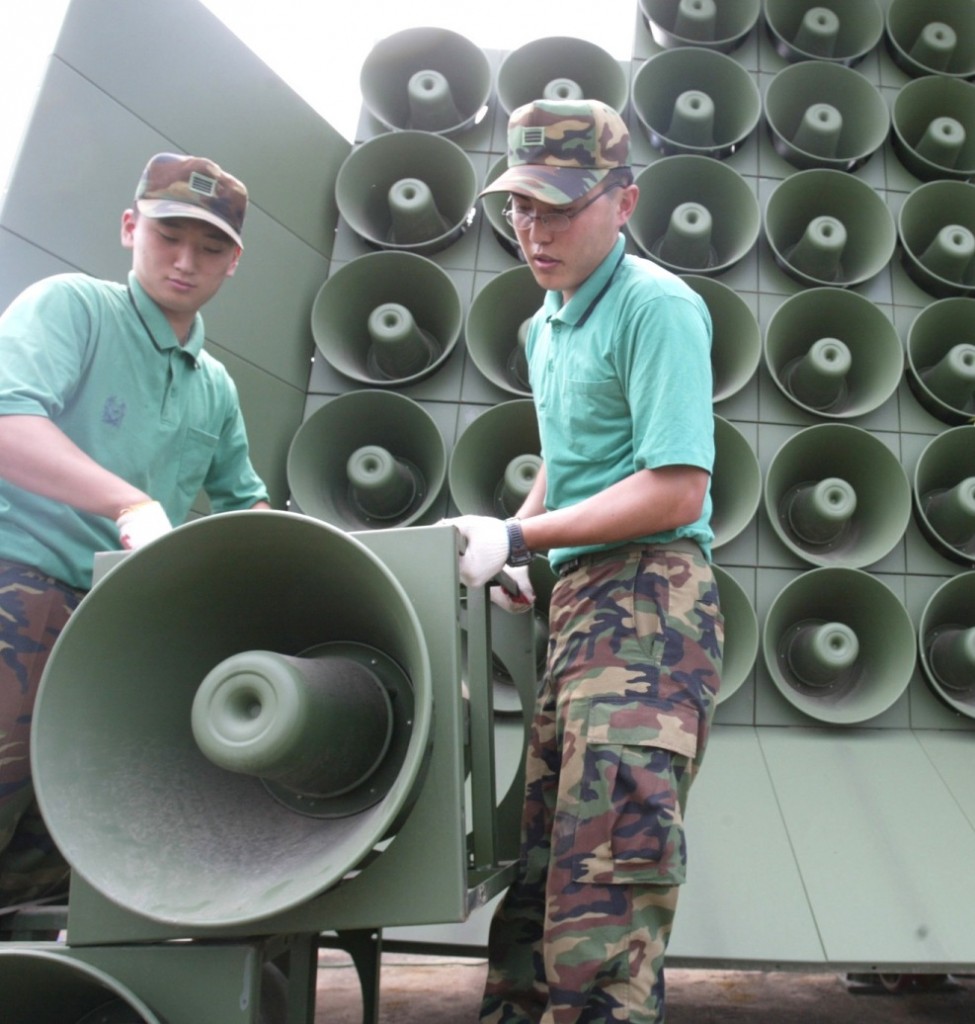- California Assembly OKs highest minimum wage in nation
- S. Korea unveils first graphic cigarette warnings
- US joins with South Korea, Japan in bid to deter North Korea
- LPGA golfer Chun In-gee finally back in action
- S. Korea won’t be top seed in final World Cup qualification round
- US men’s soccer misses 2nd straight Olympics
- US back on track in qualifying with 4-0 win over Guatemala
- High-intensity workout injuries spawn cottage industry
- CDC expands range of Zika mosquitoes into parts of Northeast
- Who knew? ‘The Walking Dead’ is helping families connect
S. Korea resumes loud speaker propaganda campaign against NK in retaliation

The loudspeaker broadcasting, a kind of psychological warfare against the communist North, started during the evening on that day and will continue on and off down the road in two spots along the border, the ministry said. (Yonhap)
SEOUL, Aug. 10 (Yonhap) — South Korea resumed a loud speaker propaganda campaign Monday along the tensely guarded border in retaliation for the detonation of a North Korean mine in the demilitarized zone last week, the Defense Ministry said.
The loudspeaker broadcasting, a kind of psychological warfare against the communist North, started during the evening on that day and will continue on and off down the road in two spots along the border, the ministry said.
“As part of retaliation for North Korea’s illegal provocation, our military will partly carry out loudspeaker broadcasting along the military demarcation line as the first step,” according to the ministry.
The ministry said the decision is in line with its pledge to make North Korea pay the harsh cost for the landmine blast.
Two South Korean staff sergeants were severely injured as landmines exploded on the southern side of the demilitarized zone in Paju, Gyeonggi Province, on Aug. 4, while they were on a patrol mission.
The South Korean military’s probe showed Monday the cause of the explosion was three North Korean wooden-box landmines which were intentionally buried in the South Korea-guarded area.
North Korea may be hard-pressed by the loudspeaker messages, which will contain the latest news in South Korea as well as the illegality of the North’s latest provocation, a ministry official noted.
The South Korean broadcasting has the potential to spread outside news and dissenting messages to the country with tightly-controlled news flow.
North Korea bitterly resents South Korean activists’ sending of anti-Pyongyang leaflets to North Korea for the same reason.
The ministry declined to disclose what part of the DML will be subject to the propaganda campaign, but sources said the affected Paju area will be one of them.
As part of a mutual agreement, the South Korean military removed border-area facilities for anti-North loudspeaker broadcasting in 2004 before putting them back on following the North’s deadly torpedoing of the South Korean Navy corvette Cheonan in 2010.
South Korea had repeatedly pledged to track down any North Korean provocations and strike the source, but the latest retaliation method is short of the previous eye-for-an eye pledge.
Defense Minister Han Min-koo again vowed harsh retaliation for the North Korean provocation, instructing military servicemen at the affected area to react to any provocation by the enemy “confidently, resolutely and without hesitation.”
“The enemy’s latest act is a clear provocation and outright violation of the armistice agreement and the non-aggression pact between the South and the North,” the defense minister said during his visit to the explosion site.
The two Koreas remain as war enemies as their bloody 1950-53 Korean War ended in a truce, not a peace treaty.
















